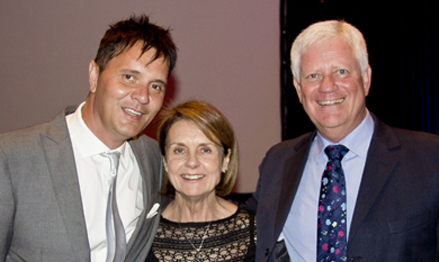|
 |
From the left are: actor Hannes van Wyk, Judge Faan Hancke and his wife Benita at the Kovsie Alumni Awards.
Photo: Elmada Kemp
24 October 2013 |
The actor and film maker, Hannes van Wyk, known for his role as Krynauw du Boisson in the M-Net soapie Egoli, was named Kovsie Alumnus of the Year during the Kovsie Alumni Awards. He and six other former Kovsie students and staff were honoured at this gala event for their outstanding achievements and contributions to the UFS during 2012.
Van Wyk, who completed his BAEd in 1990 at the University of the Free State, was honoured for his contribution to, and development of the South African Film and Television industry. This includes his work as producer, writer, researcher and director of companies such as PACOFS, M-Net and the SABC.
The actor wasn’t the only person in the public eye to be celebrated at the event.
The well-known columnist, Hanlie Retief, who interviews the top newsmakers of the country every week for Rapport, was recognised with a Cum Laude Award. She was honoured in this category together with Paul Colditz, Chief Executive Officer of FEDSAS, the national representative organisation of governing bodies, and Judge Violet Phatshoane, founder of Phatshoane & Henney Attorneys and judge in the High Court of South Africa.
Hanlie told the audience that her degree from Kovsies opened doors for her. She spoke about the interview she had in those days with the athlete Zola Budd, her first story to be published in the university publication, Bult.
Prof Johan Willemse, who is internationally known as an agricultural economist, and Dr Philemon Akach, known for his contribution to the development of Sign Language on the continent, were bestowed with the Alumni Award for outstanding service to the UFS.
The Kovsie Ambassador Award was presented to Judge Faan Hancke, Extraordinary Professor in the Faculty of Law at the UFS. As a former Kovsie, he served more than 12 years as Council member during his career and is still involved with the Alumni Trust.